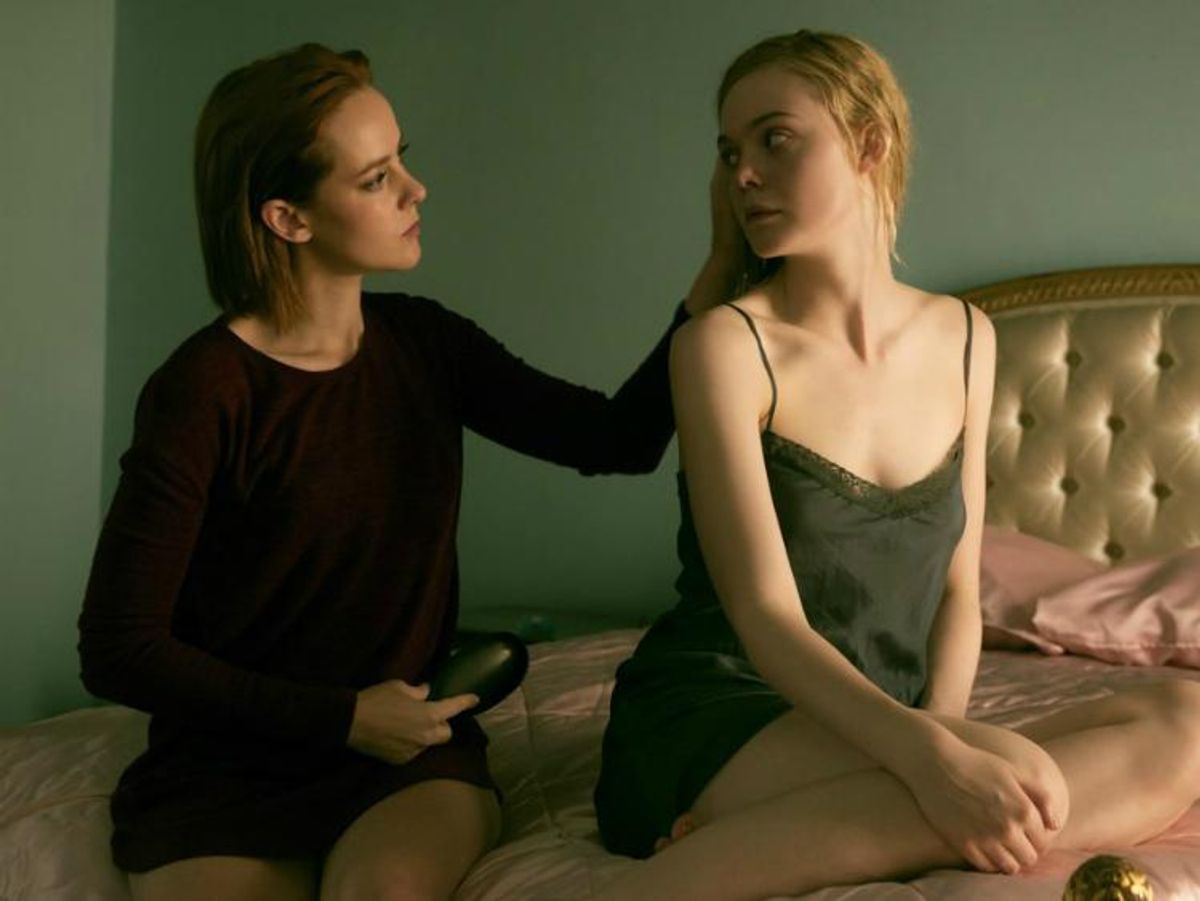
Nicholas Winding Refn's 'The Neon Demon'
The Neon Demon screams queen clichés, but Antonioni's Le Amiche is a time capsule of mid-20th century chic.
June 29 2016 2:30 PM EST
May 01 2018 11:58 PM EST
By continuing to use our site, you agree to our Private Policy and Terms of Use.

The Neon Demon screams queen clichés, but Antonioni's Le Amiche is a time capsule of mid-20th century chic.
For a movie about fashionable lesbian revenge, Nicholas Winding Refn's The Neon Demon sure is creepy. Its story of model industry intrigue, rivalry and lust turns women's sexuality against them. But not only against female careerists; it freaks the attraction--and envy--that women might feel for each other and that drag queens goodnaturedly mock.
Jena Malone's Ruby is a gay Los Angeles makeup artist, working at the hottest photo shoots, who sneakily preys on Elle Fanning's Jesse, a teenage newbie, fresh from out-of-town but with the youthful, unspoiled look craved by both fashionistas and plain-jane queers. Ruby marks the return of the predatory lesbian that used to be a common movie stereotype before gay liberation and before bodacious drag queens claimed the epithet "cunty" as a badge of pride.
Winding Refn's scream queen cliches resemble Jonathan Glazer's creep fest Under The Skin which cast ScarJo as a murderous alien identified only as "The Female." (Hetero film geeks couldn't see past their boners to condemn Glazer's sexism). From the first shot of Fanning posed as a corpse with a slit throat, The Neon Demon itself poses as a Kubrick-style cultural satire. It recalls Winding Refn's ludicrous Drive, where Ryan Gosling beat a man to death while female strippers looked on like emotionless mannequins. Kubrick is a bad role model for Winding Refn because for all his "genius," Kubrick never showed a sense of camp and that's what this absurdist-existential film lacks.
Reducing gay Ruby to a fiend and Jesse to an unlikable, if pretty, victim doesn't mean The Neon Demon is homophobic; Refn is too savvy for that. (After all, he gave us Tom Hardy's first big screen full monty in Bronson.) Yet The Neon Demon's emphasis on girlish treachery and foolishness carries vestiges of gynophobia. "Nobody likes the way they look" a model says and dewy-eyed, soft-skinned, flaxen-haired Jesse rejects the notion. Her "perfection" (contrasted to modeling agent Christine Hendrick's full-bodied womanliness) proves irresistible to Ruby who makes an obsessive, embarrassing pass.
Plain-face Ruby (seen relaxing in a freshly dug grave) just seems plain pathetic. In Refn's extreme version of throwing shade, the modeling business and its artificial presentation of femininity becomes the reverse of an infomercial. Ruby and her coven of older models exact a plan to destroy--and if necessary devour-- Jesse. And when carnivorous models vomit-up eyeballs and viscera, the film is cunty without the fun.
These ghoulish models graduated from the Mean Girls/Heathers all-white school. Even as a campy critique, The Neon Demon lacks insight into the racial-global-cultural competition that was detailed in Deborah Riley's excellent fashion doc Versailles 73: American Runway Revolution. Riley memorialized American fashion pluralism against stodgy European tradition, capturing a moment in history that "changed the course of fashion history."
Fashion history is among many insights in Michelangelo Antonioni's 1955 masterpiece Le Amiche (The Girlfriends, above), newly restored in a polished Criterion Blu-Ray. In the suspense plot, Antonioni features glamourous actresses (Eleanora Rossi Drago, Yvonne Furneaux, Valentina Cortese, Madeleine Fischer, Anna Maria Pancani) as women unfulfilled by their bourgeois fashionista status. This glorious and devastating film is also a time capsule of mid-20 th century chic. The clothes look great and the dress-up always expresses personality--both social position and spiritual.
Le Amiche goes deeper than Sex in the City. (For instance, Rossi Drago laments her ghetto background). Its profundity preserves the era of Schiaparelli, Dior, and Givenchy, never resorting to horror movie vulgarity. Antonioni knew what Hollywood's butch-styled genius designer Edith Head knew when she remarked "Fashion is character." But The Neon Demon cheapens fashion and femininity. Remember how Pauline Kael threw shade at Mike Nichols' Carnal Knowledge: "It's like a neon sign spelling out the soullessness of neon."
Want more breaking equality news & trending entertainment stories?
Check out our NEW 24/7 streaming service: the Advocate Channel!
Download the Advocate Channel App for your mobile phone and your favorite streaming device!